
David Nirenberg, Ph.D.
Professor of History
Johns Hopkins University, Baltimore
Born in 1964 in New York City, USA
Studied History at Yale University and at Princeton University
Project
A Brief History of the Jew as Enemy
"A Brief History of the Jew as Enemy" traces in essayistic form the religious, philosophical, and political deployment of ideas about Jewish carnality and enmity. The book begins in the ancient world (primarily Hellenistic Egypt), before moving to the development of Christian hermeneutics in the Early Church and Patristic periods. It studies the development and transformation of this hermeneutic in the medieval Islamic and Christian traditions, as well as its secularization in modern political thought. The project concludes with a treatment of the subject's implications for contemporary political and philosophical movements, both Christian and Islamic.Recommended Reading
Nirenberg, David. Communities of Violence: Persecution of Minorities in the Middle Ages. Princeton, NJ: Princeton University Press, 1996.
Colloquium, 03.05.2005
Judaism as a Figure of Thought, from Ancient Egypt to the Present
Despite its title, this project began in Spain, with a question about the ways in which some Christian poets insulted each other in the early fifteenth century. They accused each other of things like having big noses and "eyes of eggplant," of having sex with Jewesses or being "stuffed with Jewish sperm," of producing rhymes and meters like those of money-changers and tax-collectors: in short, of being somehow "Jewish." I set out to understand what this accusation meant, but painfully discovered what I have since confirmed in German class: Einen Satz verstehen, heißt, eine Sprache verstehen. So my project this year has been to learn this language, which we might call the "language of Judaism."
The metaphor is useful, but flawed. This was not a language of Jews, but about them. Though Jews sometimes spoke it in their own peculiar dialect, it was adopted more often, and after the first century A.D. more influentially, by non-Jews, and it is upon the latter that I focus. Nor was it really a language, but rather a vocabulary of words and concepts about Judaism that became useful for thinking and talking about certain distinctions developed in order to make sense of the world: distinctions, for example, between what seems to be and what really is, between appearance and truth, word and meaning, flesh and spirit, man and God, slavery and freedom, tyrant and sovereign.
The vocabulary of Judaism played a negligible role in ancient thought about these distinctions, but an important one in the vast project of translating that thought, first into Christianity, and then into Islam. Both of these religions made the vocabulary of Judaism central to their understanding of the nature of the world and of the language we use to represent that world. Why and how did this vocabulary become so central? What work did it do? And how was it transformed by the many contexts in which it was deployed?
The utility of the language of Judaism did not end with the Middle Ages: it played an important role in both enabling and criticizing the Reformation, the secularizations of Enlightenment and modernity, and even the re-theocratization of the world underway today. Of course its modern uses are quite different from its pre-modern ones: like any language both ancient and living, its grammar and vocabulary vary a great deal across time and space. How are these different grammars and vocabularies related to one another? We sometimes use the term "political theology" to point toward the relationship between the secularized political concepts of modernity and earlier theological ones. At its broadest, my goal in continuing the book through to the present is to explore one strand of what might be called a "critical theology": in this case, a strand that foregrounds the relationship between our contemporary critical languages and concepts and the theological language of Judaism.
Publications from the Fellow Library
Nirenberg, David (Chicago, 2021)
Uncountable : a philosophical history of number and humanity from antiquity to the present
Nirenberg, David (Chicago, 2014)
Neighboring faiths : Christianity, Islam, and Judaism in the Middle Ages and today
Nirenberg, David (New York, NY [u.a.], 2013)
Anti-Judaism : the Western tradition
Nirenberg, David (2010)
Shakespeare's Jewish questions
Nirenberg, David (2007)
Vom Verschwinden des Judentums : das christliche Spanien im Zeitalter der Massenkonversionen
Nirenberg, David (Chicago, Ill., 2006)
Nirenberg, David (2005)
Um 1300: Warum der König die Juden beschützen mußte, und warum er sie verfolgen mußte
Nirenberg, David (Princeton, NJ, 1998)
Communities of violence : persecution of minorities in the Middle Ages History
